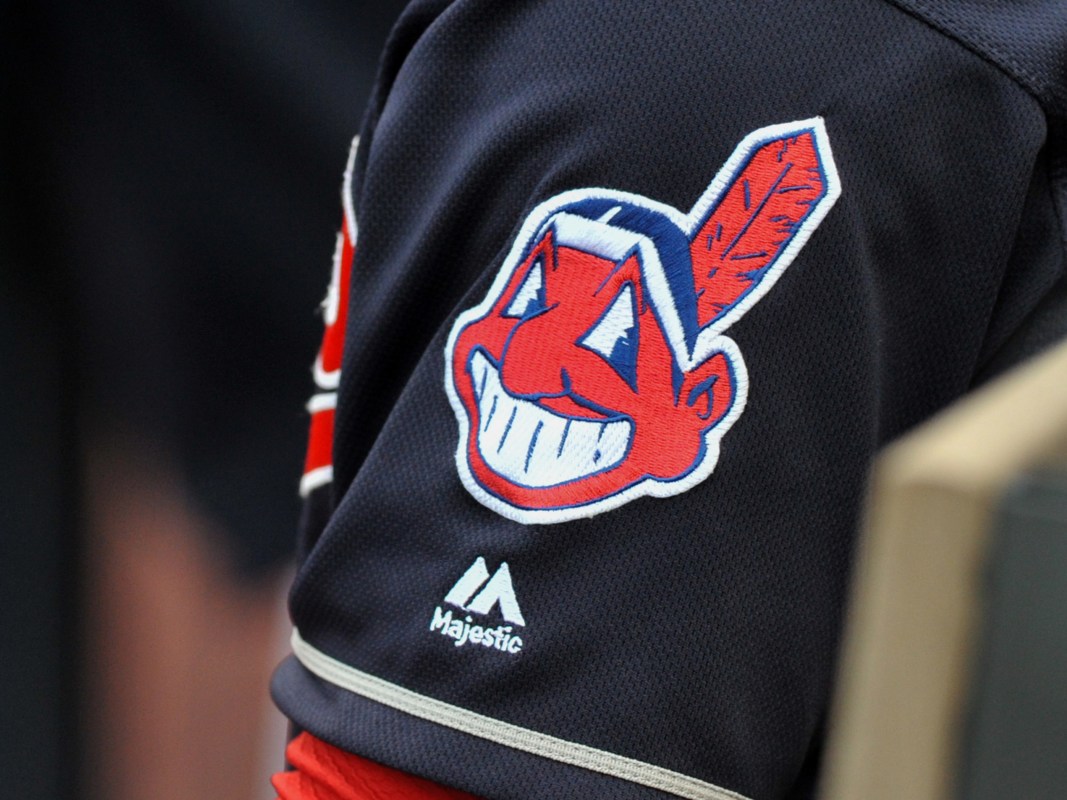Chief Wahoo isn’t going away — he’s just being repurposed — and the flagrantly racist Cleveland Indians logo’s future in merchandising could set the template for how other sports franchises manage their problematic nicknames and related imagery.
Officially adopted in 1947, Wahoo evolved from a yellow to a red-skinned caricature of a maniacally smiling Native American and until recently was the primary decoration of the team’s caps — more ubiquitously associated with the team’s branding than any of its retired Hall of Famers.
It’s been a delicate dance for “the Tribe,” as the front office seemed to recognize the baggage associated with a largely white fan base batting back any criticism of their beloved logo as an affront to Cleveland sports “heritage.” In 2014, the team began the slow process of paring back Wahoo-related imagery at Progressive Field and the team’s Arizona Spring Training complex. Two years later, the Indians announced Wahoo would be relegated to a backup logo, replaced on most game caps by a block-lettered “C.”
But even then, owner Paul Dolan defiantly told the Cleveland Plain-Dealer, “We have no plans to get rid of Chief Wahoo,” adding, “It is part of our history and legacy.” Dolan was good to his word, as Wahoo became permanently affixed to the team uniform’s shoulder patch and was prominently featured on players’ caps during the team’s run to the 2016 World Series.
Now in an apparent sea change in late January, the New York Times reported the team would finally jettison Chief Wahoo once and for all — with some caveats:
First, the Indians have admitted they are in part responding to pressure put on the franchise by MLB Commissioner Rob Manfred, who applauded the team for having decided at this late date that Wahoo is “no longer appropriate for on-field use in Major League Baseball.” Though no official connection was drawn, Cleveland hosts the MLB All-Star Game in 2019, where Wahoo would be replaced by an All-Star Game-branded patch on the Indians uniforms for the entire season anyway, creating an opportunity for the “inappropriate” logo to have a farewell tour this coming season.
Second, the team will maintain its copyright on Wahoo, allowing the Indians to continue to control the logo’s usage — a completely reasonable business practice to prevent unrelated entities from capitalizing on the team’s branding.
Finally, while Wahoo-branded merchandise will no longer be sold on the team’s MLB-associated website, official souvenir shops in Northeast Ohio and at Progressive Field will continue to carry Wahoo swag.
Could this be a template for other teams with racial identity-based imagery considered by many to be past the point of social acceptability? While even the nicknames of the Indians, Atlanta Braves, Kansas City Chiefs, and Chicago Blackhawks (to name just a few) have been called into question, no franchise has taken more heat — and been more defiant — for overtly racist branding than the Washington Redskins.
Redskins owner Dan Snyder told USA Today in 2013, “We’ll never change the name…NEVER — you can use caps,” and in the wake of the Wahoo slow-motion retirement announcement, NFL Commissioner Roger Goodell told an ESPN radio show that he wasn’t inclined to put any pressure on Snyder to change course. Goodell cited a 2016 Washington Post poll which found that approximately 9 out of 10 self-identified Native Americans were not offended by the name as good enough reason for him to avoid putting his thumb on the scales — even if that poll was widely disputed by some Native American advocacy groups.
Last December, activists created some fake websites — some meant to dupe people into thinking they were reading mainstream sports sites — as part of a ruse announcing that the Redskins had voluntarily changed their nickname to the “Redhawks.” Though the main “Redhawks” site featured a disclaimer explaining, “This website was created by Native advocates to help us all imagine how easy and powerful changing the mascot could be,” there is more truth to the statement than the hoaxster activists may have realized.
What if the Redskins shocked the sports world by following the template provided by the Indians with their slow-motion semi-retirement of Chief Wahoo?
The Washington football franchise could drop its racist nickname on an official basis, but still keep the team’s moniker on life support by promising only to sell merchandise bearing the name “Redskins” within the stadium and in the D.C. area. The NFL, like MLB, would be off the hook for tacitly endorsing such anachronistic branding, but the diehard fans who see no irony in painting offended Native Americans as perpetually aggrieved snowflakes (while using words like “tradition” and “heritage” to describe their attachment to the name “Redskins”) get to remain in hog heaven.
Such a strategy for Washington would be as cynical and insincere as the Indians’ claim that Chief Wahoo is inappropriate for the ball field, but perfectly fine for the team’s official stores. However, compromises sometimes demand ethical flexibility and while it’s not a perfect solution, the non-mainstreaming of Chief Wahoo should be applauded — albeit with reservations.
The Charge will help you move better, think clearer and stay in the game longer. Subscribe to our wellness newsletter today.

























